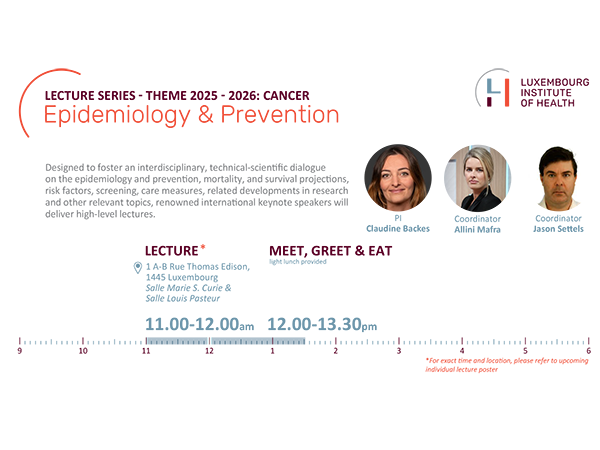🇬🇧 CONFERENCE MET’HOOD: TIME-VARYING RESIDENTIAL NEIGHBORHOOD EFFECTS ON CARDIO-METABOLIC HEALTH
The impact of urban environments on cardio-metabolic health in Luxembourg
Abstract:
Launched in 2021, the MET’HOOD (Time-varying residential neighborhood effects on cardio-metabolic health) project aimed to study the relationships between the environmental characteristics (built, natural and socio-economic) of residential neighbourhoods, cardio-metabolic health and its behaviourial risk factors such as physical activity and nutrition.
This project provided an unprecedented opportunity to analyse the long-term effects of the geographical environments on cardio-metabolic health on a national scale in Luxembourg.
Focusing on social disparities in cardio-metabolic profiles, MET’HOOD analysed how social inequalities in access to so-called ‘healthy’ urban resources are transformed over time into social inequalities in health. This conference will allow us to share with you the results of this research project and to discuss with our guests the actions and public policies that should be encouraged in view of their effect on health.
This project was conducted by the Luxembourg Institute of Socio-Economic Research (LISER) and the Luxembourg Institute of Health (LIH) and was funded by the Fond National de la Recherche (FNR) as part of the CORE 2020 programme (C20/BM/14787166).
This multidisciplinary research project is being developed by a team of geographers, epidemiologists, nutritionists and experts in physical activity and sport, with the support of local and national players in public health and spatial planning.
Conference Programme
10h00 – Welcome and registration
10h30 – Introductory speech from MET’HOOD team
10h40 – Experts’ reflections “How does residential neighborhood shape health?’
3 key note speakers in related domains of Neighborhood & Health research 40 min each (30 min presentation + 10 min Q&A)
10h40 – Julie-Anne Nazare, PhD.
Socio-ecological approaches to address lifestyle impact on obesity: examples of research projects in nutrition and physical activity
11h20 – Helene Charreire, PhD.
How can we better understand the relationship between place of residence and dietary behaviors?
12h00 – Delfien van Dyck, PhD.
How do we create activity-friendly neighbourhoods? An overview of Belgian research using quantitative and qualitative methods
12h40 – Concluding remarks
12h45 to 14h – Lunch
14h00 – Introduction
Aline Muller, CEO of LISER
Ulf Nehrbass, CEO of LIH
14h10 – Introduction from the FNR
Sean Sapcariu, Programme Manager, FNR
14h15– Presentation of MET’HOOD results
Time-varying neighborhood environments and cardiometabolic health in Luxembourg: key findings from a longitudinal study over 10 years.
Camille Perchoux (LISER), Laurent Malisoux (LIH), Marion Tharrey (LISER/LIH), Juliette van Beek (LISER), Olivier Klein (LISER), Torsten Bohn (LIH)
15h00 – Break
15h20 – Roundtable (in French)
Densification urbaine, espaces verts et paysage alimentaire : quelles actions et politiques publiques favoriser au regard de leurs effets sur la santé ?
Jean-Claude Schmit, Directeur de la Santé. Ministère de la Santé
Christine Muller, Architecte et urbaniste. Agence Dewey Muller
Dr. Philippe Muller, Médecin spécialiste en Cardiologie
Karine Paris, Coordinatrice projets Urban gardening. CELL – the transitionhub
Moderator: Jurgen Stöldt
16h25 – Concluding Remarks

📍 LOCATION
Maison des Sciences Humaines
11, Porte des Sciences
L-4366 Esch-sur-Alzette / Belval
✍️ REGISTRATION
📢 CONFERENCE ORGANISERS
Camille Perchoux (LISER), Laurent Malisoux (LIH), Marion Tharrey (LISER/LIH), Juliette van Beek (LISER), Olivier Klein (LISER), Torsten Bohn (LIH)
DATA PRIVACY
Read more about the “Data Protection Notice: processing of personal data in the scope of events’ management”.




